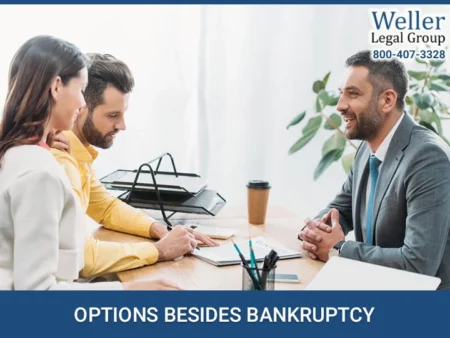 When you’re struggling with debt, filing for a Chapter 7 bankruptcy or Chapter 13 bankruptcy may be a good option. However, before doing so, you should take some time to see if there are any alternatives available because these could be your best remedy.
When you’re struggling with debt, filing for a Chapter 7 bankruptcy or Chapter 13 bankruptcy may be a good option. However, before doing so, you should take some time to see if there are any alternatives available because these could be your best remedy.
Negotiate With Your Creditors
If you either have some disposable income or you’re willing to sell some of your assets to get this type of income, you should try to negotiate with your creditors before filing for either a Chapter 7 bankruptcy or a Chapter 13 bankruptcy. Doing so may give you some time so that you can get back on your feet. Your creditors may also look at your debts and agree to settle them for less than what you actually owe.
Get Help From a Credit Counseling Agency
One of the best alternatives to bankruptcy is to get help from a credit counseling agency. While you may feel uncomfortable or unconfident negotiating with your creditors and collection agencies, these agencies can do it for you. They can also help if you have some hard-nosed
collectors and creditors who make you feel ill.
These nonprofit agencies can work with you to help you improve your financial picture by repaying your debts so that you don’t have to file for Chapter 7 bankruptcy or Chapter 13 bankruptcy. Make sure that you work with one that’s endorsed by the United States Trustee. They maintain a state-by-state list of agencies that they require debtors to complete before filing for bankruptcy. This is why this is considered one of the best alternatives to bankruptcy.
Debt Counseling vs. Chapter 13 Bankruptcy Repayment Plans
Participating in debt counseling is similar to filing for Chapter 13 bankruptcy. The agency helps you create a plan (similar to a Chapter 13 plan) in which you pay back your creditors over a certain period. However, unlike when you file for either a Chapter 13 or Chapter 7 bankruptcy, you won’t have a bankruptcy appear on your credit report. This is another reason why debt counseling is considered one of the best alternatives to bankruptcy.
It’s important to understand that while this looks like one of the best alternatives to bankruptcy, there are three disadvantages to it in comparison to filing for a Chapter 13 or Chapter 7 bankruptcy. These are:
- If you miss a payment, you aren’t protected from creditors who wish to start collection actions. This is something that any creditor can do at any time.
- Unlike with a Chapter 13, you’ll need to repay your debts in full, whereas, with bankruptcy, you’ll typically only pay a small fraction of what you actually owe.
- There are a lot of debt settlement and debt management scams around today. You’ll find that there are a lot of companies who don’t care about helping you. They’re only in it for the money. Therefore you need to be careful when you’re choosing which plan to sign up for.
Do Nothing
Another alternative to bankruptcy is to do nothing at all. Although this may surprise you, you may be “judgment proof.” Therefore anyone who sues you and wins can’t collect from you because you don’t have anything to collect. There are some unusual situations (e.g., you willfully fail to pay child support, you refuse to pay taxes as a protest against the government) you won’t be thrown in jail either.
Choose Your Next Step Now
Now that you know that there are alternatives to bankruptcy available, you may be a bit more hesitant to file for Chapter 7 bankruptcy or Chapter 13 bankruptcy. This is understandable. Make an appointment with us at the Weller Legal Group in Clearwater, FL, to discuss all of your options today.
Picture Credit: VistaCreate

